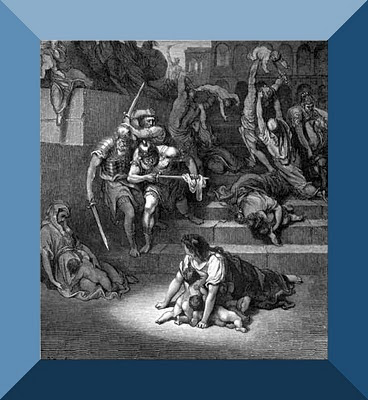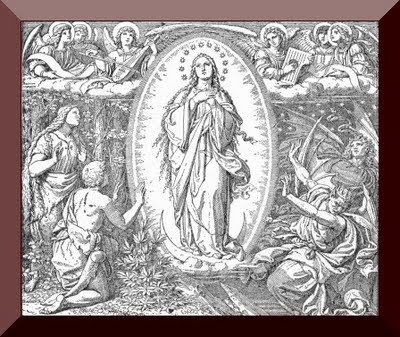What festival is this?
This festival is set apart to solemnly commemorate the coming of the three wise men from the East, guided by a miraculous star which appeared to them, and directed them to Bethlehem, where they found Christ in the stable; here they honored and adored Him and offered gifts to Him.
Why is this day called Epiphqnid Domini, or Apparition of the Lord?
Because the Church wishes to bring before our mind the three great events in the life of Christ, when He made known to man His divinity: the coming of the wise men from the East, through whom He revealed Himself to the Gentiles as the Son of God; His baptism, on which occasion His Divinity was made known to the Jews, and His first miracle at the marriage of Cana, by which He revealed Himself to His disciples.
INTROIT.
Behold the Lord the Ruler is come; and the kingdom is in his hand, and power and dominion (Mal. 3). Give to the king thy judgment, O God; and to the king's son thy justice (Ps. 71:1). Glory be to the Father.
COLLECT
God, Who on this day by the leading of a star didst reveal Thine only-begotten Son to the Gentiles; mercifully grant, that we who know Thee now by faith may be brought to contemplate the beauty of Thy majesty. Through our Lord.
Arise, be enlightened, O Jerusalem; for thy light is come, and the glory of the Lord is risen upon thee, For behold, darkness shall cover the earth, and a mist the peoples; but the Lord shall arise upon thee, and his glory shall be seen upon thee. And the Gentiles shall walk in thy light, and kings in the brightness of thy rising. Lift up thy eyes round about, and see; all these are gathered together, they are come to thee: thy sons shall come from afar, and thy daughters shall rise up at thy side. Then shalt thou see, and abound, and thy heart shall wonder and be enlarged, when the multitude of the sea shall be converted to thee, the strength of the Gentiles shall come to thee. The multitude of camels shall cover thee, the dromedaries of Madian and Epha; all they from Saba shall come, bringing gold and frankincense, and showing forth praise to the Lord.
EXPLANATION.
The Prophet Isaias, in this epistle, predicts that the light of the Lord, which is Christ, will rise over Jerusalem, the prototype of the Church, and that the Gentiles who knew nothing of the true God, would come to walk in that light which Christ, by His doctrine and holy life, would cause to shine, and that numberless nations, from all parts of the world, would assemble as her children to adore the one true God. The fulfillment of this prophecy commenced with the adoration of the Magi, who are to be regarded as the first Christian converts of the Gentiles; the Church, therefore, very properly celebrates this day with great solemnity. We ought also to share in the joy of the Church, because our ancestors were Gentiles, and like the three wise men were called to the true faith. Let us exclaim with Isaias: Give praise, O ye heavens, and rejoice, O earth, ye mountains give praise with jubilation: because the Lord hath comforted his people, and will have mercy on his poor ones (Is. 49:13).
When Jesus was born in Bethlehem of Juda, in the days of king Herod, behold there came wise men from the East to Jerusalem, saying: Where is he that is born King of the Jews? For we have seen his star in the East, and are come to adore him. And king Herod hearing this, was troubled, and all Jerusalem with him. And assembling together all the chief priests and the scribes of the people, he inquired of them where Christ should be born. But they said to him: In Bethlehem of Juda; for so it is written by the prophet: And thou, Bethlehem, the land of Juda, art not the least among the princes of Juda, for out of thee shall come forth the ruler that shall rule my people Israel. Then Herod, privately calling the wise men, learned diligently of them the time of the star which appeared to them; and sending them into Bethlehem, said: Go and diligently inquire after the child, and when you have found him, bring me word again, that I also may come and adore him. Who having heard the king, went their way; and behold, the star which they had seen in the East went before them, until it came and stood over where the child was. And seeing the star, they rejoiced with exceeding great joy. And entering into the house, they found the child with Mary his mother and falling down they adored him. And opening their treasures, they offered him gifts; gold, frankincense, and myrrh. And having received an answer in sleep that they should not return to Herod, they went back another way into their own country.
What caused the three kings to undertake so tedious a journey?
A star which God permitted to appear in their land, at the sight of which they were inwardly enlightened, so that they at once recognized its signification. Let us learn from these kings who so readily responded to the inspiration of God, by immediately undertaking so difficult a journey, to follow without delay the promptings of divine grace, and from their zeal, and the fearlessness with which they asked Herod where the Messiah would be found, we should learn to seek and practice, without fear of men, whatever is necessary for our salvation.
Why did Herod fear, and all Jerusalem with him?
Because Herod, a proud, imperious, cruel, and therefore jealous king, was afraid, when he heard of a new-born king, that he would be deprived of his throne, and punished for his vices. A bad conscience is always ill at ease, and has no peace. There is no peace to the wicked, saith the Lord God (Is. 57:21). Jerusalem, that is, the inhabitants of Jerusalem, feared because many of them were attached to Herod, and others, especially the chief priests and the scribes, feared they would be punished for their secret crimes, when the Messiah would come, of whom they knew that He shall judge the poor with justice, and with the breath of his lips he shall slay the wicked (Is. 11:4).
Why did Herod assemble the chief priests and the scribes?
Partly to find from them where the Messiah was to be born, partly and principally because God so directed it, that Herod and the chief priests, knowing the time and place of the Messiah's birth, would have no excuse for their infidelity. In the same way God often makes known to us, in the clearest manner the most wholesome truths, yet we heed them as little as did the Jews who had sufficient knowledge of the Messiah, indeed, even showed the way to the three kings, but made no use of it for themselves, and were therefore cast away.
Why did Herod say he wished to adore the child?
This he did out of wicked hypocrisy and dissimulation. He had no other intention than to put Jesus to death, and therefore affected piety to find out exactly the time and place of His birth. Thus do those murderers of souls who desire the fall of the innocent; they do not let their evil intentions be made known at once, and so they put on sheep's clothing, feign piety and devotion, until they creep into the heart from which, by flattery and irony about religion and virtue, and by presents, they expel shame, the fear of God, and thus murder the soul.
Why did the kings fall down and adore Christ?
Because by the light of faith they saw in the Infant at Bethlehem God Himself, and, notwithstanding the poverty of His surroundings, recognized in Him the expected Messiah, the new-born king of the Jews, and by prostrating themselves before Him paid Him the homage of their country.
Why did the kings offer gold, frankincense and myrrh?
Because it was the ancient Eastern custom, never to appear without presents before a prince or king, and the three kings, as the holy Fathers universally teach, enlightened by the Holy Ghost, desired by their presents to honor Christ as God, as king, and as man. Of this the venerable Bede writes: "The first of the kings, named Melchior, offered gold to Christ the Lord and king; the second, named Caspar, frankincense to the divinity of Christ; and the third, Balthassar, myrrh, by which was expressed that Christ, the Son of man, must die."
How can we bring similar offerings to Christ?
We offer gold to Him, when we love Him with our whole heart, and out of love to Him, present Him our will by perfect obedience and continual self-denial, as our will is our most precious treasure. We also offer Him gold when we assist the poor by alms given in His name. We offer Him frankincense when we devoutly and ardently pray to Him, especially when we meditate upon His omnipotence, love, goodness, justice and mercy. We offer Him myrrh when we avoid carnal desires, mortify our evil inclinations and passions, and strive for purity of body and soul.
Why did the kings return by another way to their own country?
This they did by command of God. From the example of the three wise men we should learn to obey God rather than man, that we must be obedient to His directions, even if we do not understand them; so the three kings obeyed, although they may not have understood why God commanded them to flee from Herod. After we have found God we should walk in the path of virtue, and not return to our old sinful ways. "Our fatherland is paradise, heaven," writes St. Gregory. "We have departed from it by pride, disobedience, abuse of the senses, therefore it is needed that we return to it by obedience, contempt of the world, and by taming the desires of the flesh; thus we return to our own country by another road. By forbidden pleasures we have forfeited the joys of paradise, by penance we must regain them."
Give me, O divine Savior, the faith of those Eastern kings. Enlighten my understanding with the light which enlightened them, and move my heart, that I may in future follow this light, and sincerely seek Thee who hast first sought me. Grant also, that I may really find Thee, with the wise men may adore Thee in spirit and in truth, and bring to Thee the gold of love, the frankincense of prayer, and the myrrh of penance and mortification, that, having here offered Thee the sacrifice of my faith, I may adore Thee in Thy eternal glory. Amen.
– Goffine's Devout Instructions









